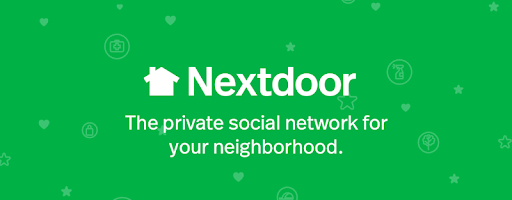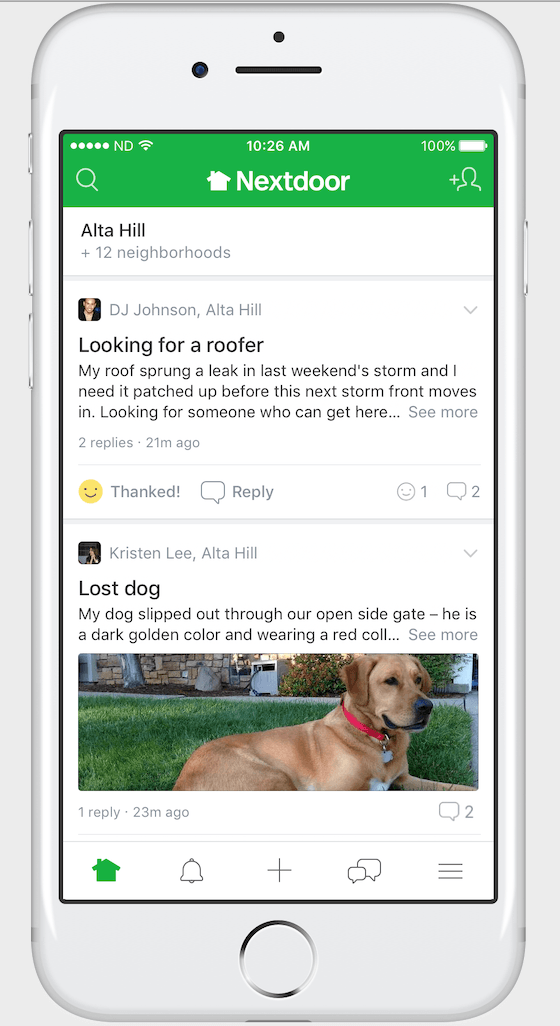Nextdoor Platform: Connecting Neighbors

According to Nextdoor, “There are so many ways our neighbors can help us, we just need an easier way to connect with them.”
What is Nextdoor?
Founded in 2011, Nextdoor is an online platform positioned as the “world’s largest social network for the neighborhood” [1]. Specifically, its mission is to facilitate conversations that empower neighbors to create stronger and safer communities. Nextdoor is pursuing this objective by defining the physical boundaries of individual neighborhoods, and building an associated, private online community site for each. Users are required to verify that they have a local address before they are allowed to join a neighborhood’s Nextdoor site. Once an online neighborhood has a critical mass of members, those members can begin creating discussion forums on a range of topics. For example, users commonly leverage the platform to find babysitters, locate lost pets, sell personal items and review local businesses.
In eight years, Nextdoor has received over $400M in financing, giving it a valuation of more than $2B. From a usership perspective, the platform has grown quickly, with about 27M active monthly users and 236K neighborhoods defined [2]. Nextdoor now operates in the US, UK, France, Germany, the Netherlands, Italy, Spain, Australia, Denmark, Sweden and Canada.
How does Nextdoor create value?
What sets Nextdoor apart from other leading social platforms is its hyper-localized approach. Importantly, the users who become members of a neighborhood site frequently know of one another already. Even if not, all users are required to sign up with their real names – aliases and pseudonyms are not allowed. Design features like this one contribute to a sense of accountability, and help build trust and community between members of each digital neighborhood [3]. Nextdoor therein becomes a secure online space where people feel safe sharing the things they would otherwise only discuss with their neighbors in person.
Nextdoor’s emphasis on local community makes the platform an asset for small business owners, too. Businesses with a verifiable local address can join a neighborhood site and create a free page promoting their services. Members of the online neighborhood can then leave reviews for the business. Arguably, positive Nextdoor reviews are more valuable to business owners than those collected on platforms like Yelp, Yahoo and Google; readers tend to give reviews more weight when they are provided by known neighbors versus unknown strangers [4].
How does Nextdoor capture value?
Nextdoor was slow to monetize its platform, allowing the social network to reach a critical scale. However, the strategy has increasingly been to drive revenue by selling online advertising space of various kinds, from native display ads to email ads. Since the Nextdoor social platform is so localized, it offers a way to achieve highly targeted and effective marketing. Nextdoor has reportedly measured that users engage with ads designed specifically for their neighborhood more often than the industry average for display and search ads (7% engagement versus 2% engagement) [5].
On the Nextdoor platform, small businesses gain inexpensive tools for promoting local sales, discounts and incentives. Nextdoor has already partnered with hundreds of advertisers from industries like home security, retail, dining, financial services, tech, telecom and automotive [6]. This aspect of the Nextdoor model – connecting users with dependable, skilled local service providers and helping those professionals expand their regional businesses – is a focus area for the company. Recently, Nextdoor announced that it has established integrations with existing platforms like Handy, HomeAdvisor and Thumbtack to increase the volume of local service providers who can advertise to each neighborhood [7].
Real estate agents have proven to be particularly lucrative customers for Nextdoor, and another focus area for the company. 75% of Nextdoor users are homeowners, and 25% of Nextdoor conversations organically relate to real estate. Nextdoor’s online communities have therefore become an invaluable resource for real estate professionals who want to engage in the dialogue with residents and demonstrate their knowledge of the local housing market. To capture this value, Nextdoor allows real estate agents to purchase limited sponsorship spots for each online neighborhood [8]. This patronage is made highly visible to users and positions the agent as the expert for the area.
The road ahead…
Nextdoor is expected to resume its international expansion. From a product perspective, Nextdoor will continue to improve its user interface, invest in personalization engines and release additional advertising formats.
One major challenge for Nextdoor is the management of its community guidelines and content moderation policies. Nextdoor online communities have traditionally been monitored and cleaned up by the users, but in 2015 a scandal broke regarding the pervasiveness of racially insensitive and offensive material on the platform. This is not a problem unique to the Nextdoor social media environment (Facebook, Twitter and Google have all made headlines for similar reasons), but a difficult one from a reputational perspective. Generally, Nextdoor has been praised for its proactive and swift handling of the situation – several policy and product changes are believed to have reduced racial profiling on the platform by 75% [9]. It remains to be seen if Nextdoor can continue to be so nimble in responding to customer experience issues as it grows.
[1] https://about.nextdoor.com
[2] https://www.wsj.com/articles/nextdoor-valued-at-over-2-billion-in-fresh-funding-round-11557833400
[3] https://digiday.com/marketing/nextdoor-ads-verified-homeowners/
[4] https://about.nextdoor.com/nextdoor-announces-local-deals-for-businesses-to-reach-local-customers/
[5] https://fortune.com/2017/05/21/nextdoor-revenue/
[6] https://digiday.com/marketing/nextdoor-ads-verified-homeowners/
[8] https://about.nextdoor.com/nextdoor-announces-new-real-estate-feature-your-home/
[9] https://hbr.org/2018/05/how-nextdoor-addressed-racial-profiling-on-its-platform




Very interesting business concept. The cultural differences once moving into international expansion will definitely be a challenge! Thank you for sharing.
This is super interesting but I am skeptical. As a PhD Student with sociological background, the first thing that jumps out at me is the question of exclusion. When I hear that the app draws boundaries between neighborhoods, I find myself asking: what effect will it have on all of the social programs to integrate neighborhoods, and lift up especially the underprivileged areas. It seems to me that having this app only make members of the top few percent of income distribution better able to exclude their communities and further solidify social closure.
Thank you for sharing this post.
I feel like as long as they expand to countries that have a similar culture to the US, their model would work. Just as Matthieu mentioned, their international expansion can also lead to them facing challenges due to the difference in culture. It will be interesting to see if they make small changes to the app the cater to these different needs.